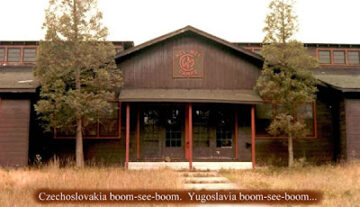by Derek Neal
 I read the opening of Peter Handke’s A Sorrow Beyond Dreams and immediately thought of Camus’ The Stranger. Here is how Handke begins:
I read the opening of Peter Handke’s A Sorrow Beyond Dreams and immediately thought of Camus’ The Stranger. Here is how Handke begins:
The Sunday edition of the Kärntner Volkszeitung carried the following item under “Local News”: “In the village of A. (G township), a housewife, aged 51, committed suicide on Friday night by taking an overdose of sleeping pills.”
My mother has been dead for almost seven weeks….
In The Stranger, Camus also begins with the notice of a mother’s death by way of print media:
Maman died today. Or yesterday maybe, I don’t know. I got a telegram from the home: “Mother deceased. Funeral tomorrow. Faithfully yours.” That doesn’t mean anything. Maybe it was yesterday.
One gets the feeling from Handke that after Camus, one can only write of a mother’s death in the shadow of Camus, that one either follows Camus or rebels against him, yet his presence is always there, undeniable. This goes in the opposite direction as well. When I read Handke’s account of his mother’s death, it led me to reconsider the beguiling opening of Camus’ novel. On some readings, Meursault has seemed indifferent to me at the beginning of The Stranger—how could someone not know whether such an important event happened this day or the day before? Yet reading Handke makes me see things differently. In Handke’s account, I see the decision to depersonalize the story as a way of coping with a terrible reality; relaying the information from the newspaper is not heartless, but the only way to dull the horror of an inexplicable event. It takes something boundless and sets limits on it, creating an official account upon which all can agree. Meursault’s decision to tell the reader about the telegram is similar. He begins by recounting his own version of events and is immediately destabilized; his inability to remember if the death occurred one day or another is not indifference but a loss of lucidity as he is overwhelmed. He then takes comfort in the objective, totalizing nature of the telegram, only to question it again after (“That doesn’t mean anything. Maybe it was yesterday.”) This is the conflict of The Stranger which plays out over the course of the novel—the meaningless, impersonal, social world represented by the telegram versus Meursault’s own subjective experience of reality, which goes beyond the limits of language. Read more »



 Many environmentalists find the climate change policy problem baffling. The core mechanism of how certain molecules create a greenhouse warming effect on the earth is extremely clear (and has been known for
Many environmentalists find the climate change policy problem baffling. The core mechanism of how certain molecules create a greenhouse warming effect on the earth is extremely clear (and has been known for  Since 2010
Since 2010  Philip Graham:
Philip Graham: 
 When I think about AI, I think about poor Queen Elizabeth.
When I think about AI, I think about poor Queen Elizabeth. Sughra Raza. Self Portrait, Kigali, January 17, 2016.
Sughra Raza. Self Portrait, Kigali, January 17, 2016. As someone who thinks about AI day-in and day-out, it is always fascinating to see which events in the AI space break out of the AI bubble and into the attention of the wider public. ChatGPT in November 2022 was of course one. The
As someone who thinks about AI day-in and day-out, it is always fascinating to see which events in the AI space break out of the AI bubble and into the attention of the wider public. ChatGPT in November 2022 was of course one. The 

 Like the Montagues and Capulets, the owners of Zam Zam and Victory restaurants – adjacent to one another on Singapore’s North Bridge Road – have been at war for roughly a century. A one-time partnership turned bad led to two families operating restaurants with almost identical menus to operate in parallel.
Like the Montagues and Capulets, the owners of Zam Zam and Victory restaurants – adjacent to one another on Singapore’s North Bridge Road – have been at war for roughly a century. A one-time partnership turned bad led to two families operating restaurants with almost identical menus to operate in parallel.

 January 16 is the anniversary of the death of Margarete Susman (1872-1966), the German-born Jewish philosopher and poet who survived the Third Reich in Swiss refuge and is buried in Zurich. To mark the occasion this year, Martin Kudla, a lecturer in Jewish intellectual history in Germany, organized a performance of lyrical texts by Susman that had been set to music by various 20th-century composers, and which he had discovered doing archival work, sung by a mezzosoprano with piano accompaniment in a recital held at Goethe University in Frankfurt.
January 16 is the anniversary of the death of Margarete Susman (1872-1966), the German-born Jewish philosopher and poet who survived the Third Reich in Swiss refuge and is buried in Zurich. To mark the occasion this year, Martin Kudla, a lecturer in Jewish intellectual history in Germany, organized a performance of lyrical texts by Susman that had been set to music by various 20th-century composers, and which he had discovered doing archival work, sung by a mezzosoprano with piano accompaniment in a recital held at Goethe University in Frankfurt.
 Are you savvy?
Are you savvy?